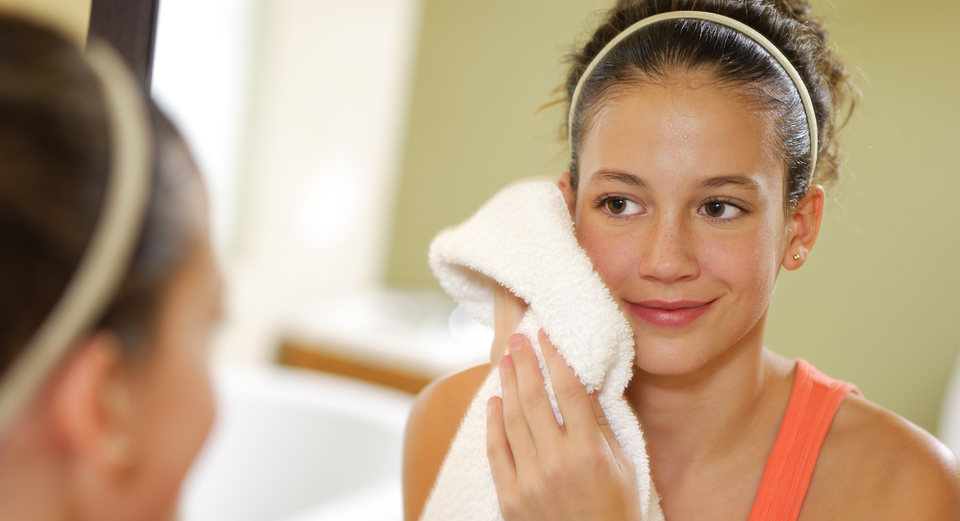Monica Constantinescu, MD, goes more than skin deep to explain how to get—and keep—your best complexion.
Day cream, night cream. Toner, astringent. Foundation, powder. So many choices, so little time.
By now everyone should have gotten the memo about using sunscreen daily. It protects the skin from cancer and from the eventual sun damage that ages complexions. But that may be one of the few things that is clear when it comes to caring for one’s face.

Monica Constantinescu, MD, a dermatologist with Kaiser Permanente South Sacramento, walked InsideKP Northern California through the best practices—and smashed a few myths—concerning sensible skin care.
What is the best regimen when caring for one’s face?
For any adult, a good skin care regimen is divided into morning and evening. In the morning you should use a cleanser to remove any oil buildup from the night, followed by a day cream with antioxidants—such as vitamins A, C, and E, resveratrol, green tea, zinc, and selenium—which protect your skin from the inside out by guarding your cells from sun’s damaging rays. Your day cream should also include a broad spectrum, minimum SPF 30 sunblock.
Before you go to bed, cleanse and then follow with an exfoliator, which will dislodge dead skin and also help brighten your complexion. Then finish with a night cream containing collagen stimulators, such as the vitamin A (retinoids) and alpha-hydroxy acids, to replenish the skin’s protective lipid barrier and stimulate collagen production over night. The exfoliator and anti-aging cream with collagen stimulators are key as we age.
Drugstore, department store, or pharmacy—does it really matter?
There are many great products out there. It’s a matter of personal choice. The important thing is matching the right products to your skin type and needs. Also, many of the products contain the same ingredients. The difference with prescription or pharmaceutical products is that they can have a higher concentration of active ingredients and generally more scientific studies backing up their efficacy.
When are the more aggressive aesthetic treatments—such as Botox and chemical peels—appropriate?
The mantra is ‘prevent, protect, and correct.’ For the last piece of that, your family physician can refer you to a dermatologist to discuss potential treatments. You can also access Cosmetic Services directly to make an appointment with a dermatologist or an aesthetician for a consultation, to look at the products that Kaiser Permanente recommends, and to learn which procedures or products may be indicated for you.
Are there any misconceptions you can clear up?
Yes, here are a few:
• People often ascribe teen acne to poor eating habits, when it is caused by hormonal disturbances and other causes that inflame the skin. Teens should cleanse and exfoliate, which helps improve, but not necessarily stop, skin breakouts.
• An SPF 30 blocks about 96 to 97 percent of the ultraviolet rays. Going to a higher SPF doesn’t result in that much more protection.
• Moisturizer needs to be applied on damp skin—not dry—to lock in that fine level of moisture.
• Astringents and toners are really synonymous. They are fine, but not essential now that cleansers are as good as they are today.
• Makeup is not bad for your skin, and you can even get it now with SPF 15 or 30, as well as antioxidants that protect and repair the skin. In general, though, try a powder foundation. Liquid foundations enter pores and clog them.
What else can we do to keep our complexion looking good?
Drinking lots of water promotes good skin. Fruits and vegetables with vitamins, green tea, and foods with anti-oxidants replenish your skin and are good for your overall health.
Reduce sun exposure, and be mindful that you are exposed to ultraviolet rays when driving or near a window indoors. Reapply sunscreen every two hours and wear a wide-brimmed hat. Smoking tends to age the skin, in addition to the myriad of ways it threatens your health. Closing thought: It is always easier to prevent skin damage than to correct it.





This Post Has 2 Comments
Oh, this is perfect timing! I need some tips for my skin. I like how you’ve said we should prevent and protect. With too much heat outside, indeed lots of water and much sunblock is what I need!
Awesome post.